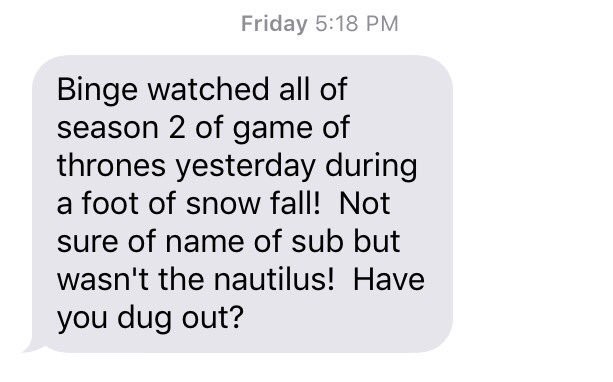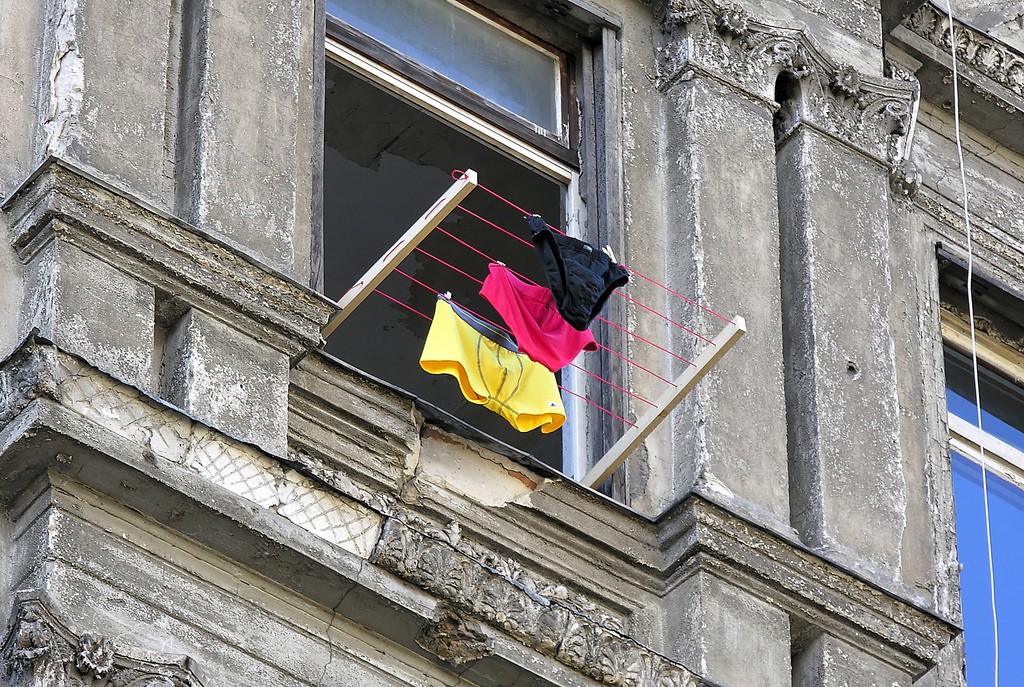What America Needs Now Is Horror Movies
Stay spooked.

Recently, in the lobby of a suburban Maryland Cineplex, I spotted a poster for Patriots Day, Peter Berg’s movie about the Boston Marathon bombings. Only a few weeks had passed since Donald Trump’s victory, and I was a raw nerve. Now I was looking at a blown-up image of Mark Wahlberg in police gear, topped by a quote proclaiming, “THE MOVIE THAT AMERICA NEEDS RIGHT NOW.” Says who?
A quick Google search showed that the quote probably came from a Nov. 18 Mashable review. Patriots Day, the article says, arrived “in the wake of this year’s divisive election and numerous incidents of unwarranted police violence” as “evidence that, while there will always be evil in this world, there will always be more good people than bad.”
That’s just the tip of the anodyne iceberg. The “movie America needs” praise has been lavished on just about every awards hopeful from 2016. Virginia Postrel, a Bloomberg writer, praises Hidden Figures as “offering patriotic balm for the fractured body politic.” Loving, according to attorney Ted Olson writing for CNN, is “an antidote to the dispiriting and debasing poison that we have been through these past brutal months.” La La Land has been heralded as a “tonic” (The New Yorker) and a “magical musical [that] will transport you from Trump-World” (The Guardian).
I like poignant movies and escaping real-life uncertainty by watching in a dark theater as a plot unfolds and neatly concludes. Ruth Negga is breathtaking in Loving. I’m thrilled that Hidden Figures explores an unfairly overlooked piece of U.S. history. All of which is to say: What I’m about to argue has little to do with the quality of these movies. (Except La La Land. The key ingredient in that saccharine tonic really is white nostalgia.)
The notion that America needs to feel better for the sake of feeling better is problematic — maybe even risky. It’s true that many people are in an emotional tailspin. An American Psychological Association (APA) survey published this week recorded a statistically significant uptick in stress levels for the first time in a decade; 49 percent of respondents described the election outcome as a source of anxiety. An ABC/Washington Post poll from January found that 35 percent of Americans reported additional stress as a result of Trump’s victory. The rest, though, felt unaffected (52 percent) or better (12 percent). Meaning, almost two-thirds of Americans said they weren’t freaking out, at least not more than usual.
My point? As the ABC/WaPo pollsters noted, “Sometimes stress can be good. It can help you develop skills needed to manage potentially threatening situations.” Like a corrupt and bigoted White House, the forces that gave it power, and the wrongs it blatantly wants to commit.
So here is a modest proposal: When it comes to movies, maybe what America needs is horror.
If this seems like a bizarre pivot, hear me out. I’m an acolyte of the horror genre, the kind who once subjected a college professor to a paper about the religious symbolism in 28 Days Later. Horror is, in my nerdy and sincere opinion, an under-appreciated cultural medium for grappling with our base fears and instincts. In his edited volume The Horror Film, critic and theorist Stephen Prince puts it well: “Musicals offer courtship rituals; Westerns and war films give us lessons about American empire…. But only horror goes straight to the deepest unease at the core of human existence.”
When it comes to movies, maybe what America needs is horror.
For starters, horror tests the limits of physical and social sensibilities. What shocks or disgusts viewers — and why? In George Romero’s classic Night of the Living Dead, the black male protagonist hits a white woman when she attempts to leave the house that’s protecting them from zombies. How staggering and, to some viewers, upsetting that act must have seemed when the film debuted in 1968, even with the hordes of flesh-eating undead staggering across the screen. More recently, in 2016’s The Witch, director Robert Eggers reveals the abject stuff of supernatural forces in the first few minutes of his 17th-century thriller. Religious zealotry, collective paranoia, and sexual fears — all very real and very contemporary — deliver the enduring shocks for the movie’s duration.
Horror films push viewers to locate what scares them: an invading force from a distant place? A terrible secret that might be buried in the house next door? Or perhaps some aspect of their own existence? Poltergeist, The Babadook, Let the Right One In, and The Stepford Wives offer prime examples of this psychological prodding. Then there are movies like Funny Games and It Follows, which upend expectations of societal and personal security. By extension, they ask how far you’d go to protect yourself and those you love — and, in some cases, if you’d go as far for a stranger. The answers can be unsettling.
Good horror movies reflect immediate social anxieties and abiding fears that humanity, in both the individual and collective senses, is under threat. The great ones go even further: “[I]t isn’t just that these traumas trigger these films,” film historian Tom Gunning once said, “but that we understand these traumas through these films.” My favorite fright-fests adjust the lens one additional time. They pose the provocative question: What if you’re the monster?
That’s what first-time director Jordan Peele, of Key & Peele fame, asks in Get Out, a thriller debuting later this month. The movie is about a young black man who visits his white girlfriend’s parents in suburbia. Things start out awkwardly, in the vein of Look Who’s Coming to Dinner. They veer into horror, though , and not because the girlfriend’s parents are, say, white nationalists out to kill a black man. That would be too obvious.
In its rave review of the movie, Variety explains: “Get Out represents a searing political statement wrapped in the guise of a more innocuous genre: the escape-the-crazies survival thriller, à la Deliverance or The Wicker Man, where sympathetic characters are held captive by a deranged cult. Except in this case, the crazies are the liberal white elite, who dangerously overestimate the degree of their own enlightenment.”
Get Out is a movie about the sociopolitical moment — sorry, epic crisis — we find ourselves in, reinforcing why many viewers are stressed about Trump’s America while shaking others out of their complacency to face their complicity. Or trying to, anyway. “We go to the theater to be entertained,” Peele told Forbes, “but if what is left after you watch the movie is a sort of eye-opening perspective on some social issues, then it can be a really powerful piece of art.”
To drive the point home, Peele is curating “The Art of the Social Thriller” at the Brooklyn Academy of Music from Feb. 17-March 1. He’s selected a dozen movies that influenced Get Out — all of them relevant to the Trump era and the currents of history that ushered it in. Rosemary’s Baby is about rape culture and women losing agency over their own bodies. Rear Window is about being trapped by circumstance and drawing conclusions based on limited information. The People Under the Stairs is about social inequality, greed, and class oppression.
Get Out and the classics that inspired it are, in my humble opinion, the movies that America needs right now. The country doesn’t need a patriotic painkiller or hollow reassurances about national goodness so that we can all sleep more soundly. It doesn’t need, as the Bloomberg review of Hidden Figures argues, “a new national story… that can acknowledge past injustices without becoming defined by them.” That sounds an awful lot like an endorsement of a narrative conveniently built on alternative facts, in which unlikely triumphs are exaggerated and systemic failures are glossed over.
In that January ABC/WaPo poll, 71 percent of white people — more of them male than female — said they didn’t feel extra stress because of Trump’s election. Yet more than half of Hispanics and nearly 40 percent of black people did. The APA survey captured different but no less upsetting figures: 54 percent of Hispanics and 69 percent of black people cited the election result as a source of stress. Only 42 percent of white people said the same.
There’s good reason for this disparity. Injustices, both realized and promised, inexorably define the world for the people they afflict or threaten. Pretending otherwise is playing with fire. Injustices, though, should do even more, disturbing people who aren’t directly aggrieved so that they can start to be better, not just feel better. Wielding the almighty power of pop culture, horror can help. And if you think that power doesn’t exist, I refer you to Geoff Nelson of Paste. “‘It’s just a movie,’” he wrote in his review of La La Land, “is the apologia of people who have never been victimized by culture.”
The Do-It-Yourself George Saunders Class
There’s a lot to do.

Have you heard that George Saunders has a novel out? The publicity has been pretty low-key, so you might not have. But in case you are curious — who is this Saunders fellow, what is he about, what’s his project? — here is something fascinating that you will not see anywhere else.
A little over three years ago I asked George Saunders whether I could sit in on one of his MFA classes at Syracuse, and, flabbergastingly, he said okay…. I’ve wrestled with how to write about the resulting experience in a way that would most clearly transmit the benefits I received to readers. I’ve reread the [Chekhov “About Love” trilogy] stories many times in the years since, and it’s always acutely pleasurable — increasingly so, in fact. The repetition in slightly different circumstances is something like the telling of a literary rosary; the same ideas seen and considered through all different prisms of personality, time and circumstance grant a newly deepened awareness each time. This is the sensation I sought to reproduce in what follows. In the end I made this kit, which provides a number of methods by which you can experience The Little Trilogy, and George Saunders’ teaching methods, on your own, according to your own purposes.
It’s Awl pal Maria Bustillos! (She spoke with Saunders for us several years back.) She’s put together a rather voluminous collection of materials on and about his Chekov class, including contributions from Sarah Miller, Ryan Bradley and David Lipsky. Be sure you carve out some time to take it all in.
A Poem by Drew Gardner
The Pleasure of Commonalities
Owning a great golf course gives you great power
— Donald Trump
The real-estate agent creates reality with his mouth.
Taking on the assumptions of a fictional narrative, in politics as you would with Lord of the Rings.
Hearing the narrative that immigrants are to blame for your problems. That different races are to blame.
The political and economic system based on tricking people.
The upper castes protecting the people. Protecting the people from seeing the systems, offering the people the fictional narrative in the place of looking at the systems. The authenticating feeling of victimization from the fictional narrative.
The bad positive assumptions — the authenticity, the white ethnic identity and its place in the caste system. Also — the bad negative assumptions. The fear of losing power. The feeling of needing a superior person to control you and control others. Someone to control your dreams and desires.
To identify with the exploiters because it is a painful reality to identify with the exploited.
The negative assumption that you can only deal with the painful reality by thinking negative thoughts about other people.
The mass of political power in the white identity politics dissociated from the truth of the caste system. We love being tricked by a delightful trick. We love prestidigitators.
Apart from assumptions of the narrative that a writer has given you — a creative prestidigitating writer. He is the writer of myths. Muthologos. A reality TV host poet speaks in a classic ancient style. He uses metaphor. His language is charged with emotion.
If I see incredible things that are here, like fast-moving gauzy clouds above the turnpike, then I can see things that are here in systems of the world. The One World Trade Center building jutting out dimly from the horizon through the bus’s window. It is newly built. The long line of buses crawling toward the Lincoln tunnel.
The petulant confidence man, full of his own emotional truths, addressing you from mass media, projecting what is true of him onto others. The shrewd broker capitalist of the broker state. The performer drawing out the petulance and bias of the people to turn it against them and betray their interests. It is poetic. The increasing hate crime.
Explosions are valuable in stories. The valuing of increasing poverty, valuing a system based on rigged gambling of the upper castes leading to explosions of poverty as helicopters explode in the movie. Explosions of new Hoovervilles and latifundias.
The bitter police cars waiting by the side of the road. The feeling of waiting for something that will never come creating a feeling of anxiety.
Anxious resentment leading to matched binaries. The snipers matching Giuliani’s death squads, becoming Giuliani. The information. The feeing of disconnection and dissociation. Of not knowing information about other people who are at a distance, but taking a fictional narrative as something that is near.
The feeling of hopelessness. The mass psychology. You manufacture the poem.
We agree with what we see on the internet and feel connected and empowered. The gun and the car empower us. We can do something about it. We can be the individual and the hero. We take the gun and drive to the pizza restaurant. We fire the gun to help the children. We are made out of stories.
Truth leaks out of the television. It leaks out of context, leaks out of attention. It leaks out of half-truths. Truth leaks through the phone corrosively.
Bubbles up, subcommander Marcos leaks through the facebook page. The Arab Spring is leaking through. The concentrated measurements of probability.
How could these mountain lions seem so real when I have created them in my dream? They are a danger to me. They have no detail. It can’t occur me to look for more. But they are so vivid and present. They are beautiful.
It can’t occur me to do something else. It is time to go underground.
The bus moves, unobstructed. The marchland is as it has been — extending. The trees are as they have been — branching. The sun, coming through the tinted window is as it has been — powering.
The branching and the powering and the commonality and the potential.
After a week of practicing for hours every day there is so much material I didn’t even get to. The thin layer of organic material spread over the earth.
It is such a beautiful day with dappled sunlight — why can’t it occur to me to do anything but kill ghouls?
We like the robber baron and trust him to help us. We like winners. Our losses are painful realities. We want the wealth and power to be concentrated. Concentrated in a representation.
We don’t want equal protection, but we want protection. The representative republic. We want someone to protect us from truth. Truth is un-poetic. We want a strong father.
There is a deal struck: “I’m going to take your money, but you get to be white.” The romantic consumerism. Identity dissociated from commonality.
A progressive poet congratulates himself on his personal virtue. The individualistic displays of liberal virtue. The virtuous performances. The splintering.
The Apple service toolkit.
The enjoyment of concentrating on the larger social and political world apart from assumptions in the narratives you have been given by the real estate agents of the caste system.
The enjoyment of moving away from the attachment to binary fictions. The enjoyment of accountability for the charged emotions and who we allow to steer the charged emotions.
The enjoyment of becoming attached to understanding what is going on, attached to concentration.
The pleasure of understanding systems, understanding commonalities.
The pleasure of choosing to not be dissociated.
The pleasure of defining common goals and acting on those definitions.
The joy in the feeling of hearing the systems.
The pleasure of practicing together.
The pleasure of playing together.
The pleasure of commonalities.
Drew Gardner is the author of Petroleum Hat (Roof) and Chomp Away (Combo). His latest book, Defender, is forthcoming from Edge in 2017. You can follow him on twitter at @chompaway.
The Poetry Section is edited by Mark Bibbins.
Hell Is Other People At A Cafe
The Adventures of Liana Finck

Liana Finck’s cartoons appear in The New Yorker and on Instagram. Her book is A Bintel Brief.
Buli, "Caught In Stasis"
It’s okay to be upset.

You know how whenever you talk about how horrible everything is now there’s always some jackass who sighs deeply and shakes his head at you and says, as if talking to a small, dull child, “Well, there are still people around who lived through two world wars, let’s not overdo it”? First of all, have you seen those people lately? They look terrible. If that’s what we’ve got coming up because of all this terror I will take a pass, thank you. Also, fuck you, suffering is not relative, no one calms themselves down at 4 AM when fears of the apocalypse judder them awake by thinking, “Well, at least I’m not covered with lice in some trench in the Ardennes.” No, they think, “Everything even half-decent about an already indecent society is being destroyed and we’re all going to die.” Go fuck yourself, “let’s not overdo it” guy. Lick my left one.
Anyway, now that I have got that off my chest, perhaps something a little calming is in order. This track from Buli — a new one to me — will do the trick quite nicely. Enjoy.
New York City, February 14, 2017

★★ The blended blue and white became a blend of white and gray. The day seemed completely ordinary, hour to hour. The cold of morning was ordinarily bitter; by lunchtime it was easy to walk around in, which likewise seemed ordinary. The clouds at some point had absented themselves and a blazingly bright sun threw the long shadows of air conditioners diagonally down a side wall, which was normal enough, in the moment. Only in the dark of evening, when it became necessary to unzip the layers, did the temperature’s long upward climb become apparent and a little unsettling.
Hauschka, "Constant Growth Fails"
Take a little break from the terror.

Here’s another one from the forthcoming Hauschka record. If this track is not going to turn your life around and make everything seem okay, it will at least give you a few minutes of pleasure on a Wednesday afternoon, and let’s not pretend that we can’t use whatever second of pleasure we are being offered at this point. GRAB IT WITH BOTH HANDS AND CRUSH IT AGAINST YOUR HEART BECAUSE YOU NEVER KNOW IF YOU MIGHT GET IT AGAIN. Also, enjoy.
Subtweeted
We’re being peeping Фом’d by Russia

This morning a producer for Fox News’ Pentagon and State Department coverage tweeted that a Russian vessel was stopped 30 miles off the coast of Connecticut, loitering:
UPDATE: Russian spy ship now located 30 miles south of Groton, CT home to a US Navy submarine base. Russian ship “loitering,” US official
Those proper nouns move the needle an above-average amount for me recognition-wise because my mother grew up in Groton, Connecticut, so I know it’s a town that serves the naval base and Coast Guard academy in nearby New London. Her father was one of the engineers who designed the U.S.S. Nautilus (the world’s first nuclear-powered submarine) in the ’50s, so I know that the buzziest member of the base’s fleet is a vessel that’s been out of duty and docked in the Thames River as a museum since the early ’80s.
My dad actually texted me a pic last week while taking a walk by the Thames, and I thought nothing of it:

Even days later, when he followed up with an update, I just went, “Huh.”

The image of the sub seems spooky now in retrospect. Were we sending out… ships for a reason? Is there… a great deal of military activity still taking place underwater?
Anecdotally, I’d say seeing a sub on the river is rare-ish — not “it never happens” rare, but “once in a blue moon” rare. Usually when I’d spot one I’d think, “Ah, they’ve gotta make sure everything’s still running,” like our nation’s submarine fleet is an old car at risk of not starting if we keep it parked in the driveway too long. And the way the government budgets for new subs suggests this is a fair assessment—all the wars I’ve grown up with have involved tanks and night vision footage of house raids, so knowing that the Nautilus once crossed the entire North Pole underwater seemed historical. We’re going to Mars, honey. We’re going to the desert. We can maintain nice subs, sure, but we won’t be innovating with them.
But today I’m worried about what kind of predator seems to be lurking with such startling proximity to my family, so suddenly I’m interested in nuclear submarines.
Here are some ideas:
- Torpedoing a nuclear submarine does not cause a nuclear explosion. This is where my brain immediately went because I am ignorant and love the arts, but apparently the reactor just sinks to the bottom of the ocean with the rest of the wreckage. Wherever it lands is ideally where it stays, because moving the reactor after the fact ends up being a lot worse for everyone radiation-wise than just letting it sit there underwater. 100% of the several sunken nuclear submarines currently at the bottom of the ocean are from Russia/the former U.S.S.R. or the United States.
- As recently as December, Russia was being a shiesty neighbor submarines-wise. If you were wondering who does still love submarines, the answer is Russia. According to England’s the Sun, Putin had sent warships to an area between Greenland, Iceland and the U.K. (known as the GIUK gap) which was historically used by the U.S.S.R. to escape Western spies. Back in December, journalists were speculating that the submarine lurking there was an attempt to exploit “a strategic ‘choke point’ in the North Atlantic used by Soviet ships during the Cold War.” One think tank expert warned about “the dangers of Putin’s forces obtaining the ‘acoustic signature’ from one of the Vanguard warships.” Or, in other words, that sitting in a sneaky location in international waters might give Russia a nice vantage point on Britain’s resting Navy from which to observe how their ships communicate with one another. “If Russia were able to obtain a recording of the [acoustic] signature, it would have serious implications for the UK’s nuclear deterrent — Russia would be able to track Vanguards and potentially sink them before they could launch their missiles.” Also not insignificant: In October, the British Navy reportedly tracked up to three Russian subs traveling through the Irish Sea on their way to Syria. :)
- According to the New London Day, Groton is a strategic naval location for the access it provides to South Asia. Sure, Connecticut grants you access to the Atlantic Ocean and everything on the other side of it, but apparently if our Navy goes under the North Pole from there, the ships could reach the South Asian theater quicker than they would if they left from our naval base in San Diego. The argument goes back and forth because of ice factors, but it seems like a reasonable route option to have in our belts regardless of whether or not it actually ends up being faster. There’s a hangup, though. To use that alternate route, our ships would have to pass through the Bering Strait between Russia and Alaska. Another choke point. Hm.
- They’re in international waters, so what they’re doing isn’t illegal, just weird. Our Navy would like to pass along that they’re watching this situation “like a hawk.”
- There are now reports of an accompanying spy boat, which seems decidedly less sneaky and more “lol fuck you.” Connecticut Senator Chris Murphy tweeted, “Russia is acting like it has a permission slip to expand influence, test limits of reach. Questions are obvious: does it, and if so, why?” Some reasonable queries!
So the gist is: we’re getting spied on. But we’re getting spied on by a spy who isn’t too worried about hiding, because he kind of wants us to know that he’s spying. We’re being peeping Tom’d. And if procedural crime dramas have conditioned me to expect anything from a perp who wants you to know he’s watching, it’s that he’s going to get off on everyone making a big stink about how bad he is for ignoring a boundary. Yay!
Before a whirlpool forms and drags me to the bottom of the sea, I’ll leave you with one non-terrifying fact. During the time of the Nautilus’ launch, America was proud, and Disney’s art department designed a patch for the ship’s crew to wear on their uniforms. It looked like this:


Deutschland Über Us
How’s it going over in the last bastion of liberal democracy?

Guten Tag, friends, and Willkommen to a thing in which I investigate everything that’s happening in and around the Federal Republic of Germany, where the Earth’s last remaining sentinel against widespread nuclear armageddon, Angela Merkel, offers us a full Pantone array of sensible suits, ruthless punctuality, and a foreign and domestic policy that made her a close ally of Barack Obama, but unapologetically “center-right” in a political landscape that also includes the Pirate Party.
We Americans might feel a a whiff of Gewissensbiß, as Nietzsche would say (the “bite of conscience”), that Germans of all people get to lord their comparatively progressive, inclusive worldview over us for the next possibly-four years. After all, how bad did it have to get for the Volk who brought us the Holocaust to feel fully justified in putting this bad boy on the cover of Der Spiegel?
Der neue SPIEGEL. Ab jetzt zum Download und ab morgen im Laden erhältlich: https://t.co/qv6ihBqCQm
Der Spiegel, by the way, means “the mirror,” as in, Germans are supposed to see themselves reflected in it — and what they see is a metric fuck-ton of superiority to the nation who, only a few decades ago, had to chop their best city into four pieces because they couldn’t even be trusted to do that themselves.
Yes, Germans must be feeling pretty good about themselves these days, because if there is one thing they love more than passive-aggressively ringing their bicycle bells at pedestrians, it’s being right all the time. That’s why last week’s mortifying moment at a Fed Cup tennis match — when a singer belted out the wrong version of the German national anthem, the Nazi version, the Deutschland über alles version, and not the current one, that begins Einigkeit und Recht und Freiheit, or “unity, justice and freedom”—is the best thing to happen to the Fatherland since Knight Rider started streaming.
Because suddenly they’re not the bad guys for having the Nazi anthem (and the Nazis) in the first place. No, we’re the doofuses who are so illiterate in other languages that we can’t Wikipedia Deutschlandlied, and apparently also (at least unconsciously) so insecure in the shadow of our own little Dorito Führer that we have to remind Germany what they did so that we won’t look so bad. (Hint: It didn’t work.)
Well, Germans, I’m here to take you down a Kerbe. We may have recently ruined our democracy (something you know nothing about), but you recently ruined the best thing about your television. Germans will attempt to tell you that the best show on German television is something called “Tatort” (“Crime Scene,” literally “place of the deed”), a program that’s been running for 47 years, and is sort of “CSI” with bad lighting, dramatic pauses that are much too long, and intermittent nudity, that even the most cynical citizen of the Federal Republic will halt the entirety of his Sunday evening to watch.
(The Germans don’t seem to care what we do with “Tatort” here, so you can watch entire episodes on YouTube. Here’s one. It’s got at least one naked butt.)
Other Germans will attempt to tell you that they only watch American television, and this can mean one of two things: That they illegally stream our good shows in English, or that they watch our terrible shows dubbed. (Germans love “The King of Queens:” Fact.) But what only the most self-aware will admit is that the true treasures of the Teutonic Fernseher (literally, “far-seer,” as in, zis contreption lets you see ze sings zat are far away) are the scores of cheaply produced reality shows, which go by the most German word possible, by which I mean it is a compound of two English words used incorrectly: Doku-Soaps.
It’s not that our own docu-soaps aren’t ridiculous. Clearly they are. But every show in the U.S. at least has a gimmick to suck viewers in to the banality of its particular brand of evil: This family has twenty-five children! These people have been stranded on an island with only a television crew and plenty of food and water a slight distance away! These women all married rich guys at one point or another! These women are all little people — but they’re ALSO bitches! To be featured on American unscripted television, a person or situation must be extraordinary in some way, either enviable or pitiable.
In Germany, the more normal the situation, the more likely it is to be televised. I think the most popular reality show in the history of German television would be a crew filming a random 55-year-old couple while they go to the grocery store and complain to the cashier that the box of chocolate breakfast cereal they always get has decreased a gram in volume but increased three cents in price.
Case in point: An entire show called “Versicherungsdetektive” (“Insurance Detectives”) that follows the exploits of two dudes who go around investigating the middling instances of fraud that may or may not occur when a nation insures every single possession it owns. In one episode, the Insurance Detectives ran an iPhone over with a car (and it was unscathed) just to prove that a guy lied when he claimed his grandmother dropped his and cracked the screen. (They eventually discovered that he’d whacked the screen with a hammer in order to get his insurance to pay for a new model.)
But even the Insurance Detectives pale in comparison to a series called mieten, kaufen, wohnen (rent, buy, live), which is sort of like our “HouseHunters,” except the properties are unremarkable three-room walk-ups, and every potential tenant, being German, is chronically unimpressed.
It’s masterful. Or, at any rate, it was. I’m sorry to say that one month and three days before the election of Donald Trump, the show ended its eight-year-run in a shameful rubble-heap of its former might.
For reasons I cannot begin to fathom other than that apparently Germans enjoy ruining perfect things, in its later years the producers of mieten, kaufen, wohnen decided to add a level of intrigue by creating false conflicts between the Makler and the client. Aki is a vegan, but agent Peter loves to eat Hackfleisch, a.k.a. chopped up bits of raw meat spread onto bread that no German under the age of 112 eats in earnest. How’s that going to go?????? Unwatchably, like this scene with a schoolteacher made to wait for twos of minutes for a Makler named Hanka, who apologizes unconvincingly about traffic.
Mieten, kaufen, wohnen was once a nominally unwatchable show that I somehow couldn’t stop watching. In its new incarnation, both the agents and the potential clients—nary a professional or even amateur actor among them—spent the episodes playing out scripted conflicts.
The unbridled genius of mieten, kaufen, wohnen was that it took the German propensity for literalism to its most delightful apex, and made a reality television show that actually depicted reality — which, being reality, is unremarkable. And now it’s destroyed. Nice job, Germans. (Note: For any Germans out there, I do not mean “nice job” literally. I am being sarcastic. That is when you say a thing that is the opposite of what you mean in a mocking voice. It’s a form of something called “humor.”)
The good news, I suppose, is that this means the Germans aren’t kicking our asses at everything nonstop. Sure, they still have a functioning democracy for now. But the shame of what they did to the best show on their television will outlive them all.
You Suck At Telling Stories And Yet You Still Keep Talking
Just play the hits, okay?

You know how when your friend is telling you a story about something that happened to him recently, the whole time in your head you’re like, “Good Lord, this is so boring and impossible to make sense of, what a fucking nightmare, now I’ve got to nod and pretend to be following along, here’s where I throw in a ‘right, right,’ and a ‘go on,’ sweet Christ he is still talking, will this story ever end, I wish he would just tell me the one about the time he got so drunk he fell down three separate flights of stairs again, oh thank God, it feels like he is coming to a conclusion, now we can talk about sports”? Well, you are not alone, and there’s a good reason for it:
“People are fairly awful storytellers who leave out a lot of important information,” says Harvard University’s Dr. Daniel T. Gilbert, who conducted a series of studies into why everyone around you is so fucking boring and impossible to listen to. “Our friends probably would enjoy hearing us tell them about a painting they’ve never seen or a book they’ve never read if we could describe those things well. But most of us can’t [because we suck so bad at relating anything save the most basic events yet that doesn’t keep us from being all blah blah blah until the person we’re talking to wishes for death’s sweet embrace.]” People are better at telling stories that their listeners are familiar with, the study shows, but only because we are so accustomed to the details that the terrible inarticulacy of the person relating the tale does not prevent us from tolerating them.
There is also something in the study about how you are just as likely to be boring your friend to tears and thoughts of final, lasting escape when you tell your own terrible stories, but I’m sure they are not talking about you specifically, everything you say is fascinating. Please, go on.
